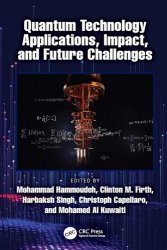 Название
Название: Quantum Technology Applications, Impact, and Future Challenges
Автор: Mohammad Hammoudeh, Clinton Firth, Harbaksh Singh, Christoph Capellaro
Издательство: CRC Press
Год: 2025
Страниц: 205
Язык: английский
Формат: pdf (true), epub
Размер: 13.0 MB
This book presents a comprehensive exploration of Quantum Computing, exploring its wide-ranging applications across industries, elucidating its transformative impact on diverse sectors, and addressing the forthcoming challenges and future directions within this rapidly evolving field.
Quantum Technology Applications, Impact, and Future Challenges explores the current state of quantum hardware and software, providing readers with a clear understanding of the challenges and opportunities posed by this technology. It also examines how Quantum Computing is being used today in industries such as energy, finance, healthcare, and logistics, offering real-world examples of the potential impact of this technology. Readers will gain an understanding of quantum computing’s potential applications and its profound implications for businesses, individuals, and society at large. Through a blend of theoretical insights, practical examples, and thought-provoking discussions, this book equips readers with the knowledge and vision to navigate quantum technology with confidence. Authored and edited by leading academics and industry experts in the field, the book offers authoritative insights and perspectives, ensuring readers receive credible and up-to-date information on Quantum Computing advancements and applications.
Combining Quantum Computing and Machine Learning is a breakthrough point in computational science. Quantum physics, the foundational theory that governs particle behaviour at the quantum level, can improve Machine Learning, a branch of Artificial Intelligence (AI) that allows systems to uncover patterns and insights in data. This chapter briefly discusses Quantum Computing and Machine Learning, providing insight into the benefits that motivate researchers and practitioners to merge these disparate domains.
Quantum Computing uses quantum physics techniques to process information differently from classical computing. Quantum bits, or qubits, exist in several states simultaneously due to superposition. This property allows quantum computers to study multiple solutions simultaneously, implying exponential acceleration in specialized tasks. Quantum gates, like traditional logic gates, use unitary transformations to manipulate qubits and construct quantum circuits that execute quantum algorithms. Quantum algorithms have the potential to accelerate optimization and data processing dramatically. The possibility of more successfully addressing computationally challenging problems fuels the drive to incorporate Quantum Computing into Machine Learning procedures.
Quantum Machine Learning (QML) identifies complex patterns and correlations in data through novel methodologies such as quantum feature mapping and entanglement. These quantum-inspired techniques offer a chance to enhance the capabilities of Machine Learning models. Classical Machine Learning techniques, such as regression and decision trees, have proven tremendously beneficial in various applications. These algorithms are based on sequential processing and classical bits, limiting their scalability as datasets grow and problems become more complex.
This book navigates readers through the intricate landscape of Quantum Computing and communications, offering valuable perspectives for scholars, researchers, and practitioners alike.
Contents:
1- Quantum Computing for Future Energy Systems
2- Application of Quantum Computing in the Energy Industry, Decarbonization and Sustainability
3- The Role of Quantum Technologies in Driving Change in Business and Personal Domains
4- Fundamentals of Quantum Machine Learning, Applications and Tools
5- Optimization and Machine learning - Quantum Annealing, Quantum and Neural Network
6- Exploring Security Risks in Data Privacy Mechanism
7- Hybrid Quantum-Classical Computing Architectures
8- Quantum Data Centers and Quantum Cloud
9- Quantum as a Service in Cloud Computing
10- Future Directions and Challenges, Quantum Supremacy and Beyond
11- A peek into the Post-Quantum Era (PQA/PQC): "What will happen in 2030?"
Скачать Quantum Technology Applications, Impact, and Future Challenges
[related-news]
[/related-news]